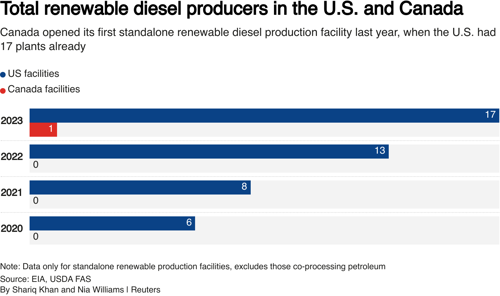Canada's renewable diesel projects hit by U.S. import surge
- S. exports 530 MM liters (l) of renewable diesel to Canada in H1
- Falling credit market values will hit cash flow for new projects
- British Columbia government not planning changes to LCFS program
Canadian renewable fuel producers are facing lower returns on new facilities due to a slump in British Columbia's low carbon fuel standard (LCFS) credit market, a trend expected to persist amid a flood of exports from the United States.
Weakness in British Columbia's LCFS credit market reflects growing pains in the international biofuels industry, where many regulators are cracking down on imports to protect their nascent domestic markets from oversupply.
Low-carbon fuels are more expensive to produce than petroleum-based gasoline or diesel. LCFS programs help to bridge the gap by issuing credits to suppliers of fuels with lower emissions intensity, which can be sold to those with higher-carbon fuels that need to bring down their emissions.
Canada has lagged the U.S. in setting up domestic renewable diesel production. British Columbia is the only Canadian province with an LCFS credit market, which helped encourage Calgary-based Tidewater Renewables to open the country's first standalone renewable diesel refinery last year. Others are also betting on the credits to support construction of more facilities in British Columbia and other provinces.
At the same time, the LCFS has also made Canada an attractive outlet for a glut of U.S. renewable diesel.
U.S. producers shipped at least 530 MMl of renewable diesel to Canada in the first six months of 2024, a jump from 151 MMl in the same period last year, according to data compiled by Will Faulkner, founder of industry analysis firm Carbon Acumen.
British Columbia's LCFS credits fell to C$207 in July and C$350 in August, after trading above C$400 for more than two years previously, ringing alarm bells for Tidewater.
The company said in August that the slump hurt its ability to generate revenues, and blamed weakening prices on a surge in renewable diesel imports from the United States. Tidewater subsequently sold some assets and future credits to its majority stockholder to avoid financial distress.
British Columbia LCFS credit values rose to C$456 in September, but credit market transactions reported last month could have been completed before the price crash in July, Faulkner said. There has not been a significant slowdown in U.S. imports, he noted.
Tidewater only produces renewable fuel at its 3,000-bpd, or about 170-MMlpy, plant in British Columbia, so is highly exposed to low credit values there.
However, falling BC LCFS credits may also weigh on returns for individual renewable fuel projects owned by diversified energy producers such as Imperial Oil and Parkland, said Sam Harrison, senior analyst at Navius Research.
Imperial is building a C$720-MM ($518.25-MM) 20,000-bpd renewable diesel facility in Alberta, the largest in Canada, that will be partly funded by LCFS credits granted by British Columbia.
"This correction downwards in the market will affect Imperial's cash flow from the renewable diesel that they're able to sell into the British Columbia market," Harrison said.

Construction on Imperial's project, which is expected to start production in 2025, is progressing and the project is highly attractive, a spokeswoman told Reuters when asked about the decline in credits.
Parkland declined to comment on how a renewable fuel producing unit at its 55,000-bpd Burnaby refinery would be impacted by declining LCFS credit values, but said a stable policy environment had helped incentivize low carbon fuel manufacturing in British Columbia.
Regulatory challenges. Biofuels are set to play a major role in global efforts to cut climate-warming emissions from transportation. The International Energy Agency (IEA) forecasts global renewable diesel demand will grow to 26.4 Blpy (liters per year) by 2028 based on current policies, from an estimated 18.6 Blpy in 2023. More aggressive policies could see demand surpass 39 Bl.
British Columbia aims to produce 1.5 Bl of renewable fuels by 2030.
The provincial government said it is not currently considering changes to the program, as credit prices naturally fluctuate based on supply and demand dynamics.
In contrast, the European Union this year began levying anti-dumping tariffs on Chinese biofuels after complaints that Chinese producers benefit from artificially low output costs. The EU has also levied tariffs on U.S. and Canadian biodiesel imports since 2021 following similar complaints.
Some analysts expect British Columbia's LCFS market to remain under pressure, with oversupply from the U.S. compounded by lower biofuel feedstock prices that make renewable diesel cheaper to produce.
Low-carbon fuel producers and importers can now also claim Canada's Clean Fuel Regulation (CFR) credits for actions that earn them LCFS credits. Introduced last year, the CFR credits are adding to British Columbia's attractiveness as an outlet for excess U.S. renewable diesel.
Higher government support for renewable diesel producers in the U.S. has the potential to limit Canadian industry growth, the U.S. Department of Agriculture said in a report last year.
"At issue is the fact that U.S. producers can claim the $1/gallon U.S. federal Blenders Tax Credit which is issued for producing and blending biomass based diesel in the U.S., along with Canadian CFR credits, which are issued for selling renewable fuels in the market in Canada on top of B.C.'s LCFS credits," Faulkner said.
($1 = 1.3893 Canadian dollars)






Comments